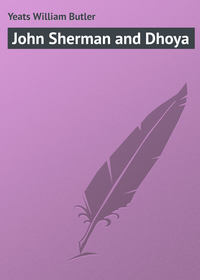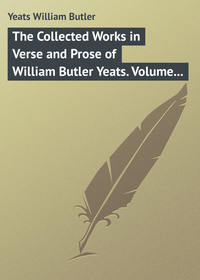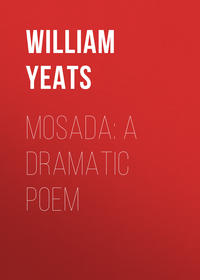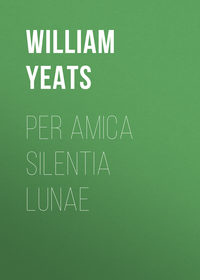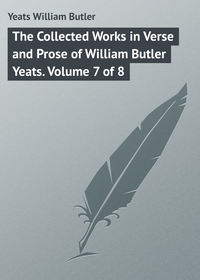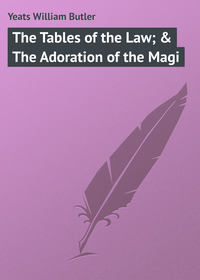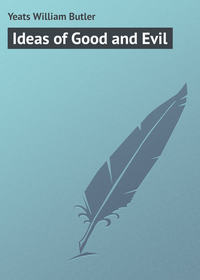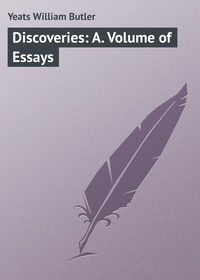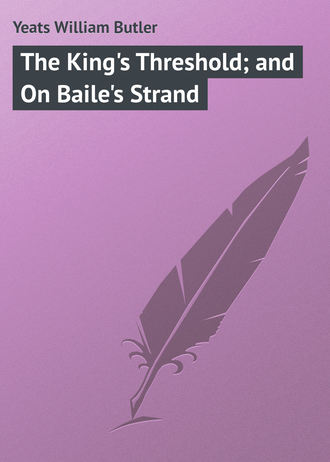 полная версия
полная версияThe King's Threshold; and On Baile's Strand
Barach.
No, no.
[He begins pulling Fintain towards the door.
Fintain.
If you do not get it now, you may never get it, for the young man may kill him.
Barach.
No, no, I am hungry. What a head you have, blind man! Who but you would have remembered that the hen-wife slept for a little at noon every day!
Fintain.
[Who is being led along very slowly and unwillingly.] Yes, I have a good head. The fowl should be done just right, but one never knows when a wild dog may come out of the woods.
[They go out through the big door at the back. As they go out Cuchullain and certain Young Kings come in at the side door. Cuchullain, though still young, is a good deal older than the others. They are all very gaily dressed, and have their hair fastened with balls of gold. The young men crowd about Cuchullain with wondering attention.
First Young King.You have hurled that stone beyond our utmost markTime after time, but yet you are not weary.Second Young King.He has slept on the bare ground of Fuad’s HillThis week past, waiting for the bulls and the deer.Cuchullain.Well, why should I be weary?First Young King.It is certainHis father was the god who wheels the sun,And not King Sualtam.Third Young King.[To a Young King who is beside him.] He came in the dawn,And folded Dectara in a sudden fire.Fourth Young King.And yet the mother’s half might well grow weary,And it new come from labours over sea.Third Young King.He has been on islands walled about with silver,And fought with giants.[They gather about the ale vat and begin to drink.
Cuchullain.Who was it that went out?Third Young King.As we came in?Cuchullain.Yes.Third Young King.Barach and blind Fintain.Cuchullain.They always flock together; the blind manHas need of the fool’s eyesight and strong body,While the poor fool has need of the other’s wit,And night and day is up to his ears in mischiefThat the blind man imagines. There’s no hen-yardBut clucks and cackles when he passes byAs if he’d been a fox. If I’d that ballThat’s in your hair and the big stone again,I’d keep them tossing, though the one is heavyAnd the other light in the hand. A trick I learntWhen I was learning arms in Aoife’s country.First Young King.What kind of woman was that Aoife?Cuchullain.Comely.First Young King.But I have heard that she was never married,And yet that’s natural, for I have never knownA fighting woman, but made her favours cheap,Or mocked at love till she grew sandy dry.Cuchullain.What manner of woman do you like the best?A gentle or a fierce?First Young King.A gentle, surely.Cuchullain.I think that a fierce woman’s better, a womanThat breaks away when you have thought her won,For I’d be fed and hungry at one time.I think that all deep passion is but a kissIn the mid battle, and a difficult peace’Twixt oil and water, candles and dark night,Hill-side and hollow, the hot-footed sun,And the cold sliding slippery-footed moon,A brief forgiveness between oppositesThat have been hatreds for three times the ageOf this long ’stablished ground. Here’s Concobar;So I’ll be done, but keep beside me still,For while he talks of hammered bronze and asksWhat wood is best for building, we can talkOf a fierce woman.[Concobar, a man much older than Cuchullain, has come in through the great door at the back. He has many Kings about him. One of these Kings, Daire, a stout old man, is somewhat drunk.
Concobar.[To one of those about him.] Has the ship gone yet?We have need of more bronze workers, and that shipI sent to Africa for gold is late.Cuchullain.I knew their talk.Concobar.[Seeing Cuchullain.] You are before us, King.Cuchullain.So much the better, for I welcome youInto my Muirthemne.Concobar.But who are these?The odour from their garments when they stirIs like a wind out of an apple garden.Cuchullain.My swordsmen and harp players and fine dancers,My bosom friends.Concobar.I should have thought, Cuchullain,My graver company would better matchYour greatness and your years; but I waste breathIn harping on that tale.Cuchullain.You do, great King.Because their youth is the kind wandering waveThat carries me about the world; and if it sank,My sword would lose its lightness.Concobar.Yet, Cuchullain,Emain should be the foremost town of the world.Cuchullain.It is the foremost town.Concobar.No, no, it’s not.Nothing but men can make towns great, and he,The one over-topping man that’s in the world,Keeps far away.Daire.He will not hear you, King,And we old men had best keep companyWith one another. I’ll fill the horn for you.Concobar.I will not drink, old fool. You have drunk a hornAt every door we came to.Daire.You’d better drink,For old men light upon their youth againIn the brown ale. When I have drunk enough,I am like Cuchullain as one pea another,And live like a bird’s flight from tree to tree.Concobar.We’ll to our chairs for we have much to talk of,And we have Ullad and Muirthemne, and hereIs Conall Muirthemne in the nick of time.[He goes to the back of stage to welcome a company of Kings who come in through the great door. The other Kings gradually get into their places. Cuchullain sits in his great chair with certain of the young men standing around him. Others of the young men, however, remain with Daire at the ale vat. Daire holds out the horn of ale to one or two of the older Kings as they pass him going to their places. They pass him by, most of them silently refusing.
Daire.Will you not drink?An Old King.Not till the council’s over.A Young King.But I’ll drink, Daire.Another Young King.Fill me a horn too, Daire.Another Young King.If I’d drunk half that you have drunk to-day,I’d be upon all fours.Daire.That would be naturalWhen Mother Earth had given you this good milkFrom her great breasts.Cuchullain.[To one of the Young Kings beside him.]One is content awhileWith a soft warm woman who folds up our livesIn silky network. Then, one knows not why,But one’s away after a flinty heart.The Young King.How long can the net keep us?Cuchullain.All our livesIf there are children, and a dozen moonsIf there are none, because a growing childHas so much need of watching it can makeA passion that’s as changeable as the seaChange till it holds the wide earth to its heart.At least I have heard a father say it, but IBeing childless do not know it. Come nearer yet;Though he is ringing that old silver rodWe’ll have our own talk out. They cannot hear us.[Concobar who is now seated in his great chair, opposite Cuchullain, beats upon the pillar of the house that is nearest to him with a rod of silver, till the Kings have become silent. Cuchullain alone continues to talk in a low voice to those about him, but not so loud as to disturb the silence. Concobar rises and speaks standing.
Concobar.I have called you hither, Kings of Ullad, and KingsOf Muirthemne and Connall Muirthemne,And tributary Kings, for now there is peace —It’s time to build up Emain that was burnedAt the outsetting of these wars; for we,Being the foremost men, should have high chairsAnd be much stared at and wondered at, and speakOut of more laughing overflowing heartsThan common men. It is the art of kingsTo make what’s noble nobler in men’s eyesBy wide uplifted roofs, where beaten gold,That’s ruddy with desire, marries pale silverAmong the shadowing beams; and many a timeI would have called you hither to this work,But always, when I’d all but summoned you,Some war or some rebellion would break out.Daire.Where’s Maine Morgor and old Usnach’s children,And that high-headed even-walking Queen,And many near as great that got their deathBecause you hated peace? I can rememberThe people crying out when Deirdre passedAnd Maine Morgor had a cold gray eye.Well, well, I’ll throw this heel-tap on the ground,For it may be they are thirsty.A King.Be silent, fool.Another King.Be silent, Daire.Concobar.Let him speak his mind.I have no need to be afraid of ghosts,For I have made but necessary wars.I warred to strengthen Emain, or becauseWhen wars are out they marry and begetAnd have their generations like mankindAnd there’s no help for it; but I’m well contentThat they have ended and left the town so great,That its mere name shall be in times to comeLike a great ale vat where the men of the worldShall drink no common ale but the hard will,The unquenchable hope, the friendliness of the sword.[He takes thin boards on which plans have been carved by those about him.
Give me the building plans, and have you writtenThat we – Cuchullain is looking in his shield;It may be the pale riders of the windThrow pictures on it, or that Mananan,His father’s friend and sometime fosterer,Foreknower of all things, has cast a vision,Out of the cold dark of the rich sea,Foretelling Emain’s greatness.Cuchullain.No, great King,I looked on this out of mere idleness,Imagining a far-off country and oneThat held it with a sword, although a woman.Concobar.A woman needs but laugh, or a friend sigh,And you’re afar off sounding through the world,While I plan Emain’s greatness.[The sound of a trumpet without.
Open the doors!I hear a herald’s trumpet, and await,It may be, the heavy fleeces of the seaAnd golden and silver apples or ancient crownsLong hidden in the well at the World’s End,Or glittering garments of the salmon, tributesFrom the Great Plain, or the high people of Sorcha,Or the walled garden in the east of the world.[The great door at the back is flung open; a Young Man, who is fully armed and carries a shield with a woman’s head painted on it, stands upon the threshold. Behind him are trumpeters. He walks into the centre of the hall, the trumpeting ceases.
What is your message?Young Man.I am of Aoife’s army.First King.Queen Aoife and her army have fallen upon us.Second King.Out swords! Out swords!Third King.They are about the house.Fourth King.Rush out! Rush out! Before they have fired the thatch.Young Man.Aoife is far away. I am alone.I have come alone in the midst of youTo weigh this sword against Cuchullain’s sword.[There is a murmur amongst the Kings.
Concobar.And are you noble? for if of common seedYou cannot weigh your sword against his swordBut in mixed battle.Young Man.I am under bondsTo tell my name to no man, but it’s noble.Concobar.But I would know your name and not your bonds.You cannot speak in the Assembly HouseIf you are not noble.A King.Answer the High King.Young Man.[Drawing his sword.] I will give no other proof than the hawk givesThat it’s no sparrow.[He is silent a moment, then speaks to all.
Yet look upon me, Kings;I too am of that ancient seed and carryThe signs about this body and in these bones.Cuchullain.To have shown the hawk’s gray feather is enough,And you speak highly too.[Cuchullain comes down from his great chair. He remains standing on the steps of the chair. The Young Kings gather about him and begin to arm him.
Give me that helmet!I’d thought they had grown weary sending champions.That leathern coat will do. The High King thereBeing old in wisdom can think of times to come,But the hawk’s sleepy till its well-belovedCries out amid the acorns, or it has seenIts enemy like a speck upon the sun.What’s Emain to the hawk when that clear eyeIs burning nearer up in the high air?That buckle should be tighter. Give me your shield.There is good level ground at Baile’s Yew-tree,Some dozen yards from here, and it’s but truthThat I am sad to-day and this fight welcome.[He looks hard at the Young Man, and then steps down on the floor of the Assembly House. He grasps the Young Man by the shoulder.
Hither into the light.[Turning to one of the Young Kings.
The very tintOf her that I was speaking of but now:Not a pin’s difference.[To the Young Man.
You are from the North,Where there are many that have that tint of hair,Red-brown, the light red-brown. Come nearer, boy!For I would have another look at you.There’s more likeness, a pale, a stone pale cheek.What brought you, boy? Have you no fear of death?Young Man.Whether I live or die is in the Gods’ hands.Cuchullain.That is all words, all words, a young man’s talk;I am their plough, their harrow, their very strength,For he that’s in the sun begot this bodyUpon a mortal woman, and I have heard tellIt seemed as if he had outrun the moon,That he must always follow through waste heaven,He loved so happily. He’ll be but slowTo break a tree that was so sweetly planted.Let’s see that arm; I’ll see it if I like.That arm had a good father and a good mother,But it is not like this.Young Man.You are mocking me.You think I am not worthy to be fought,But I’ll not wrangle but with this talkative knife.Cuchullain.Put up your sword, I am not mocking you.I’d have you for my friend, but if it’s notBecause you have a hot heart and a cold eyeI cannot tell the reason. You’ve got her fierceness,And nobody is as fierce as those pale women.[To the Young Kings.
We’ll keep him here in Muirthemne awhile.A Young King.You are the leader of our pack and thereforeMay cry what you will.Cuchullain.You’ll stop with usAnd we will hunt the deer and the wild bulls,And, when we have grown weary, light our firesIn sandy places where the wool-white foamIs murmuring and breaking, and it may beThat long-haired women will come out of the dunesTo dance in the yellow fire-light. You hang your head,Young man, as if it was not a good life;And yet what’s better than to hurl the spear,And hear the long-remembering harp, and dance?Friendship grows quicker in the murmuring dark;But I can see there’s no more need for wordsAnd that you’ll be my friend now.First Old King.Concobar,Forbid their friendship, for it will get twistedTo a reproach against us.Concobar.Until nowI’d never need to cry Cuchullain onAnd would not now.First Old King.They’ll say his manhood’s quenched.Cuchullain.I’ll give you gifts, but I’ll have something too,An arm-ring or the like, and if you willWe’ll fight it out when you are older, boy.An Old King.Aoife will make some story out of this.Cuchullain.Well, well, what matter, I’ll have that arm-ring, boy.Young Man.There is no man I’d sooner have my friendThan you whose name has gone about the worldAs if it had been the wind, but Aoife’d sayI had turned coward.Cuchullain.I’ll give you giftsThat Aoife’ll know and all her people knowTo have been my gifts. Mananan, son of the sea,Gave me this heavy embroidered cloak. Nine QueensOf the Land-under-Wave had woven itOut of the fleeces of the sea. O! tell herI was afraid, or tell her what you will.No! tell her that I heard a raven croakOn the north side of the house and was afraid.An Old King.Some witch of the air has troubled Cuchullain’s mind.Cuchullain.No witchcraft, his head is like a woman’s headI had a fancy for.Second Old King.A witch of the airCan make a leaf confound us with memories.They have gone to school to learn the trick of it.Cuchullain.But there’s no trick in this. That arm-ring, boy.Third Old King.He shall not go unfought, I’ll fight with him.Fourth Old King.No! I will fight with him.First Old King.I claim the fight,For when we sent an army to her land —Second Old King.I claim the fight, for one of Aoife’s galleysStole my great cauldron and a herd of pigs.Third Old King.No, no, I claim it, for at Lammas’ time —Cuchullain.Back! Back! Put up your swords! Put up your swords!There’s none alive that shall accept a challengeI have refused. Laegaire, put up your sword.Young Man.No, let them come, let any three together.If they’ve a mind to, I’ll try it out with four.Cuchullain.That’s spoken as I’d spoken it at your age,But you are in my house. Whatever manWould fight with you shall fight it out with me.They’re dumb. They’re dumb. How many of you would meet[Drawing his sword.
This mutterer, this old whistler, this sandpiper,This edge that’s grayer than the tide, this mouseThat’s gnawing at the timbers of the world,This, this – Boy, I would meet them all in armsIf I’d a son like you. He would avenge meWhen I have withstood for the last time the menWhose fathers, brothers, sons, and friends I have killedUpholding Ullad; when the four provincesHave gathered with the ravens over them.But I’d need no avenger. You and IWould scatter them like water from a dish.Young Man.We’ll stand by one another from this out.Here is the ring.Cuchullain.No, turn and turn about,But my turn is first, because I am the older.Cliodna embroidered these bird wings, but FandMade all these little golden eyes with the hairsThat she had stolen out of Aengus’ beard,And therefore none that has this cloak about himIs crossed in love. The heavy inlaid broochThat Buan hammered has a merit too.[He begins spreading the cloak out on a bench, showing it to the Young Man. Suddenly Concobar beats with his silver rod on a pillar beside his chair. All turn towards him.
Concobar.[In a loud voice.] No more of that, I will not have this friendship.Cuchullain is my man and I forbid it;He shall not go unfought for I myself —Cuchullain.[Seizing Concobar.] You shall not stir, High King, I’ll hold you there.Concobar.Witchcraft has maddened you.The Kings.[Shouting.] Yes, witchcraft, witchcraft.A King.You saw another’s head upon his shouldersAll of a sudden, a woman’s head, Cuchullain.Then raised your hand against the King of Ullad.Cuchullain.[Letting Concobar go, and looking wildly about him.]Yes, yes, all of a sudden, all of a sudden.Daire.Why, there’s no witchcraft in it, I myselfHave made a hundred of these sudden friendshipsAnd fought it out next day. But that was folly,For now that I am old I know it is bestTo live in comfort.A King.Pull the fool away!Daire.I’ll throw a heel-tap to the one that dies.Concobar.Some witch is floating in the air above us.Cuchullain.Yes, witchcraft, witchcraft and the power of witchcraft.[To the Young Man.
Why did you do it? was it Calatin’s daughters?Out, out, I say, for now it’s sword on sword.Young Man.But, but, I did not.Cuchullain.Out, I say, out, out!Sword upon sword.[He goes towards the door at back, followed by Young Man. He turns on the threshold and cries out, looking at the Young Man.
That hair my hands were drowned in![He goes out, followed by Young Man. The other Kings begin to follow them out.
A King.I saw him fight with Ferdiad.Second King.We’ll be too late,They’re such a long time getting through the door.Third King.Run quicker, quicker.Daire.I was at the Smith’sWhen he that was the boy Setanta then —[Sound, of fighting outside.
Third King.He will have killed him.They have begun the fight![They all go out, leaving the house silent and empty. There is a pause during which one hears the clashing of the swords. Barach and Fintain come in from side door. Barach is dragging Fintain.
Barach.
You have eaten it, you have eaten it, you have left me nothing but the bones.
Fintain.
O, that I should have to endure such a plague. O, I ache all over. O, I am pulled in pieces. This is the way you pay me for all the good I have done you!
Barach.
You have eaten it, you have told me lies about a wild dog. Nobody has seen a wild dog about the place this twelve month. Lie there till the Kings come. O, I will tell Concobar and Cuchullain and all the Kings about you!
Fintain.
What would have happened to you but for me, and you without your wits? If I did not take care of you what would you do for food and warmth?
Barach.
You take care of me? You stay safe and send me into every kind of danger. You sent me down the cliff for gull’s eggs while you warmed your blind eyes in the sun. And then you ate all that were good for food. You left me the eggs that were neither egg nor bird. [The blind man tries to rise. Barach makes him lie down again.] Keep quiet now till I shut the door. There is some noise outside. There are swords crossing; a high vexing noise so that I can’t be listening to myself. [He goes to the big door at the back and shuts it.] Why can’t they be quiet, why can’t they be quiet! Ah, you would get away, would you? [He follows the blind man who has been crawling along the wall and makes him lie down close to the King’s chair.] Lie there, lie there. No, you won’t get away. Lie there till the Kings come, I’ll tell them all about you. I shall tell it all. How you sit warming yourself, when you have made me light a fire of sticks, while I sit blowing it with my mouth. Do you not always make me take the windy side of the bush when it blows and the rainy side when it rains?
Fintain.
O good fool, listen to me. Think of the care I have taken of you. I have brought you to many a warm hearth, where there was a good welcome for you, but you would not stay there, you were always wandering about.
Barach.
The last time you brought me in, it was not I who wandered away, but you that got put out because you took the crubeen out of the pot, when you thought nobody was looking. Keep quiet now, keep quiet till I shut the door. Here is Cuchullain, now you will be beaten. I am going to tell him everything.
Cuchullain.
[Comes in and says to the fool.] Give me that horn.
[The fool gives him a horn which Cuchullain fills with ale and drinks.
Fintain.
Do not listen to him, listen to me.
Cuchullain.
What are you wrangling over?
Barach.
He is fat and good for nothing. He has left me the bones and the feathers.
Cuchullain.
What feathers?
Barach.
I left him turning a fowl at the fire. He ate it all. He left me nothing but the bones and feathers.
Fintain.
Do not believe him. You do not know how vain this fool is. I gave him the feathers, because I thought he would like nothing so well.
[Barach is sitting on a bench playing with a heap of feathers, which he has taken out of the breast of his coat.
Barach.[Singing.] When you were an acorn on the tree top —Fintain.
Where would he be but for me? I must be always thinking, thinking to get food for the two of us, and when we’ve got it, if the moon’s at the full or the tide on the turn, he’ll leave the rabbit in its snare till it is full of maggots, or let the trout slip through his hands back into the water.
Barach.[Singing.] When you were an acorn on the tree top,Then was I an eagle cock;Now that you are a withered old block,Still am I an eagle cock!Fintain.
Listen to him now! That’s the sort of talk I have to put up with, day out day in.
[The fool is putting the feathers into his hair. Cuchullain takes a handful of feathers out of the heap and out of the fool’s hair, and begins to wipe the blood from his sword with them.
Barach.
He has taken my feathers to wipe his sword. It is blood that he is wiping from his sword!
Fintain.
Whose blood? Whose blood?
Cuchullain.
That young champion’s.
Fintain.
He that came out of Aoife’s country?
Cuchullain.
The Kings are standing round his body.
Fintain.
Did he fight long?
Cuchullain.
He thought to have saved himself with witchcraft.
Barach.
That blind man there said he would kill you. He came from Aoife’s country to kill you. That blind man said they had taught him every kind of weapon that he might do it. But I always knew that you would kill him.




